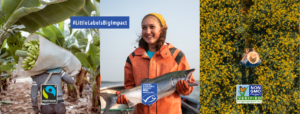If you’re like many shoppers, you want to know how the food you buy affects people and the planet, including how it was grown, harvested and produced. You seek out greater transparency from stores like ours, as well as from your favorite brands and the companies who produce your food.
We, too, believe you have a right to know if what you’re buying aligns with your values! That’s where third party certifications play a big role. When you see the little labels by independent third-party certifiers on your food, you know that product underwent a rigorous evaluation to ensure it met a set of strict standards.
To highlight the positive impacts these labels make, this January we’re celebrating Think Big, Shop Little Labels all month – honoring Fairtrade America, Marine Stewardship Council and the Non-GMO Project! By looking for the Non-GMO Project, Fairtrade America and Marine Stewardship Council labels, you can shop sustainably throughout our store! Read on to learn how they are driving big, meaningful change in our food system!
What is Non-GMO Project Verified?
GMOs (or genetically modified organisms) are living organisms whose genetic material has been manipulated in a laboratory through genetic engineering, creating combinations of plant, animal, bacteria, and/or virus genes that do not occur in nature or through traditional crossbreeding methods.
Non-GMO Project verification means that a product is compliant with the Non-GMO Project Standard, the most rigorous third-party standard for GMO avoidance, which includes stringent provisions for ingredient testing and traceability and the most up-to-date definitions around new GMO techniques.
What is Fairtrade America?
Every day, we enjoy products planted, grown, harvested and transported by farmers and workers around the world. These farmers and workers often do not earn enough to have a decent living — that is, to eat nutritious food, send their kids to school, have adequate shelter and weather a crisis. Many live on less than $2 per day.
The Fairtrade Mark works towards rebalancing trade. By choosing Fairtrade, you are choosing to prioritize the farmers and workers behind our everyday purchases. You are choosing products that are certified to meet the rigorous standards developed in partnership with producers.
What is MSC Certified?
The MSC blue fish label is an ecolabel that can be found on seafood products from fresh, canned, and frozen seafood to omega-3 supplements and even pet food. It can also be found alongside seafood items on menus. The blue fish helps shoppers and diners identify seafood that is wild-caught and that has been independently verified for environmental sustainability, because a healthy ocean is vital for people and the planet. By purchasing products with the MSC blue fish label, you are directly supporting well-managed fisheries that have been assessed by a third-party on its impacts on wild fish populations and the ecosystems they’re part of.
When you see the MSC blue fish label on packaging, you can feel good knowing you are supporting continuous changes on the water to help protect the ocean for the future. 95% of MSC certified fisheries make improvements so they continue to meet the high bar of the MSC Fisheries Standard.
Why do we need such labels on food anyway?
“Natural” food and “fair” food are big business these days and greenwashing has become a serious problem. By making unverified or uncertified claims about how their food is grown, caught, or processed (“self-made” marketing claims), some unscrupulous companies capitalize on shoppers’ desire for high-quality food because it supports people and the planet. In response, there is a sea of different labels popping up with claims that sound really good, but have little backing them up.
How does an informed shopper know what label is supported and which are empty marketing words? Choosing well-recognized, independent, third-party certification labels on products is the best place to start. Labels like the Fairtrade Mark, Marine Stewardship Council (MSC) Certified, and Non-GMO Project Verified represent rigorous standards with requirements that must be followed in order to receive the label. This may actually require laboratory testing and supply chain accountability that allows for “identity preservation.”
Fairtrade America, Marine Stewardship Council, and the Non-GMO Project are all nonprofit organizations driven by their collective mission to change how food is harvested or made in order to better serve people and the planet. Fairtrade has been operating internationally since 1989, MSC’s sustainable fishing standard has been in effect since 1998, and Non-GMO Project has been verifying products since 2010. The nonprofits publish their standards on their websites to give shoppers full transparency. Brands both large and small showcase this compliance by including the Fairtrade, MSC, or Non-GMO Project labels on their packaging. This further gives shoppers assurance that it’s not a fad but a sustainability tool used by brands to have a true, positive impact.
What you can do Think big and shop the labels! Our store will be highlighting products that are Fairtrade, MSC Certified and Non-GMO Project Verified throughout January. Support brands working towards a more sustainable future, and try something new.
Want to learn more?
Follow the Butterfly with the Non-GMO Project. Sign up for their newsletters and like them on social
media @NonGMOProject.
Get the scoop on Fairtrade. Sign up to receive Fairtrade America’s newsletter and follow them on
social media @FairtradeMarkUS.
Learn how your choices at the grocery store can make a big difference for the health of our ocean
at MSC.org. Get to know the people behind the label that make sustainable seafood possible at @MSCbluefish.


